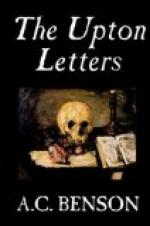T. B.
Monk’s orchard, Upton,
July 11, 1904.
My dear Herbert,—I am going to pour out a pent-up woe. I have just escaped from a very fatiguing experience. I said good-bye this morning, with real cordiality, to a thoroughly uncongenial and disagreeable visitor. You will probably be surprised when I tell you his name, because he is a popular, successful, and, many people hold, a very agreeable man. It is that ornament of the Bar, Mr. William Welbore, K.C. His boy is in my house; and Mr. Welbore (who is a widower) invited himself to stay a Sunday with me in the tone of one who, if anything, confers a favour. I had no real reason for refusing, and, to speak truth, any evasion on my part would have been checked by the boy.
It is a fearful bore here to have any one staying in the house at all, unless he is so familiar an old friend that you can dispense with all ceremony. I have no guest-rooms to speak of; and a guest is always in my study when I want to be there, talking when I want to work, or wanting to smoke at inconvenient times. One’s study is also one’s office; boys keep dropping in, and, when I have an unperceptive guest, I have to hold interviews with boys wherever I can—in passages and behind doors. What made it worse was that it was a wet Sunday, so that my visitor sate with me all day, and I have no doubt thought he was enlivening a dull professional man with some full-flavoured conversation. Then one has to arrange for separate meals; when I am alone I never, as you know, have dinner, but go in to the boys’ supper and have a slice of cold meat. But on this occasion I had to have a dinner-party on Saturday and another on Sunday; and the breakfast hour, when I expect to read letters and the paper, was taken up with general conversation. I am ashamed to think how much discomposed I was; but a schoolmaster is practically always on duty. I wonder how Mr. Welbore would have enjoyed the task of entertaining me for a day or two in his chambers! But one ought not, I confess, to be so wedded to one’s own habits; and I feel, when I complain, rather like the rich gentleman who said to John Wesley, when his fire smoked, “These are some of the crosses, Mr. Wesley, that I have to bear.”
I could have stood it with more equanimity if only Mr. Welbore had been a congenial guest. But even in the brief time at my disposal I grew to dislike him with an intensity of which I am ashamed. I hated his clothes, his boots, his eye-glass, the way he cleared his throat, the way he laughed. He is a successful, downright, blunt, worldly man, and is generally called a good fellow by his friends. He arrived in time for tea on Saturday; he talked about his boy a little; the man is in this case, unlike Wordsworth’s hero, the father of the child; and the boy will grow up exactly like him. Young Welbore does his work punctually and without interest; he plays games respectably; he likes to know the right




